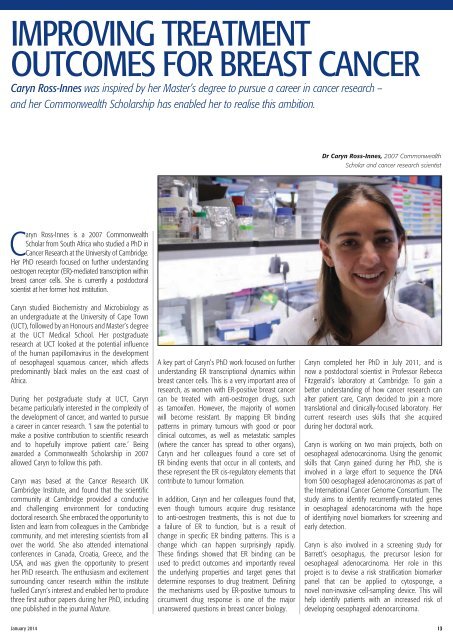cs-news-issue-18
cs-news-issue-18
cs-news-issue-18
Create successful ePaper yourself
Turn your PDF publications into a flip-book with our unique Google optimized e-Paper software.
IMPROVING TREATMENTOUTCOMES FOR BREAST CANCERCaryn Ross-Innes was inspired by her Master’s degree to pursue a career in cancer research –and her Commonwealth Scholarship has enabled her to realise this ambition.Dr Caryn Ross-Innes, 2007 CommonwealthScholar and cancer research scientistCaryn Ross-Innes is a 2007 CommonwealthScholar from South Africa who studied a PhD inCancer Research at the University of Cambridge.Her PhD research focused on further understandingoestrogen receptor (ER)-mediated transcription withinbreast cancer cells. She is currently a postdoctoralscientist at her former host institution.Caryn studied Biochemistry and Microbiology asan undergraduate at the University of Cape Town(UCT), followed by an Honours and Master’s degreeat the UCT Medical School. Her postgraduateresearch at UCT looked at the potential influenceof the human papillomavirus in the developmentof oesophageal squamous cancer, which affectspredominantly black males on the east coast ofAfrica.During her postgraduate study at UCT, Carynbecame particularly interested in the complexity ofthe development of cancer, and wanted to pursuea career in cancer research. ‘I saw the potential tomake a positive contribution to scientific researchand to hopefully improve patient care.’ Beingawarded a Commonwealth Scholarship in 2007allowed Caryn to follow this path.Caryn was based at the Cancer Research UKCambridge Institute, and found that the scientificcommunity at Cambridge provided a conduciveand challenging environment for conductingdoctoral research. She embraced the opportunity tolisten and learn from colleagues in the Cambridgecommunity, and met interesting scientists from allover the world. She also attended internationalconferences in Canada, Croatia, Greece, and theUSA, and was given the opportunity to presenther PhD research. The enthusiasm and excitementsurrounding cancer research within the institutefuelled Caryn’s interest and enabled her to producethree first author papers during her PhD, includingone published in the journal Nature.A key part of Caryn’s PhD work focused on furtherunderstanding ER transcriptional dynami<strong>cs</strong> withinbreast cancer cells. This is a very important area ofresearch, as women with ER-positive breast cancercan be treated with anti-oestrogen drugs, suchas tamoxifen. However, the majority of womenwill become resistant. By mapping ER bindingpatterns in primary tumours with good or poorclinical outcomes, as well as metastatic samples(where the cancer has spread to other organs),Caryn and her colleagues found a core set ofER binding events that occur in all contexts, andthese represent the ER cis-regulatory elements thatcontribute to tumour formation.In addition, Caryn and her colleagues found that,even though tumours acquire drug resistanceto anti-oestrogen treatments, this is not due toa failure of ER to function, but is a result ofchange in specific ER binding patterns. This is achange which can happen surprisingly rapidly.These findings showed that ER binding can beused to predict outcomes and importantly revealthe underlying properties and target genes thatdetermine responses to drug treatment. Definingthe mechanisms used by ER-positive tumours tocircumvent drug response is one of the majorunanswered questions in breast cancer biology.Caryn completed her PhD in July 2011, and isnow a postdoctoral scientist in Professor RebeccaFitzgerald’s laboratory at Cambridge. To gain abetter understanding of how cancer research canalter patient care, Caryn decided to join a moretranslational and clinically-focused laboratory. Hercurrent research uses skills that she acquiredduring her doctoral work.Caryn is working on two main projects, both onoesophageal adenocarcinoma. Using the genomi<strong>cs</strong>kills that Caryn gained during her PhD, she isinvolved in a large effort to sequence the DNAfrom 500 oesophageal adenocarcinomas as part ofthe International Cancer Genome Consortium. Thestudy aims to identify recurrently-mutated genesin oesophageal adenocarcinoma with the hopeof identifying novel biomarkers for screening andearly detection.Caryn is also involved in a screening study forBarrett’s oesophagus, the precursor lesion foroesophageal adenocarcinoma. Her role in thisproject is to devise a risk stratification biomarkerpanel that can be applied to cytosponge, anovel non-invasive cell-sampling device. This willhelp identify patients with an increased risk ofdeveloping oesophageal adenocarcinoma.January 2014 13


